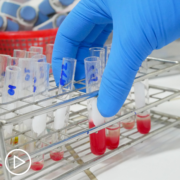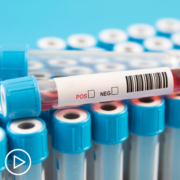How Close Is Personalized Medicine for Myeloma?
How Close Is Personalized Medicine for Myeloma? from Patient Empowerment Network on Vimeo.
Therapy targeting specific mutations or abnormalities is becoming increasingly common in cancer care, but are we there in myeloma? Dr. Ashley Rosko discusses how clinicians are using test results and patient factors to move closer to individualizing myeloma care.
Dr. Ashley Rosko is Medical Director of the Oncogeriatric Program at the Ohio State University Comprehensive Cancer Center – The James. Learn more about Dr. Rosko.
Related Programs:

|

Making Treatment Decisions | Understanding Common Myeloma Therapies |
Transcript:
Katherine:
Dr. Rosko, in many other cancers, we’ve been hearing about targeted therapies and immunotherapies. In some cases, a specific mutation or chromosomal abnormality may indicate that a particular treatment may be effective. Are we there yet in multiple myeloma care?
Dr. Rosko:
Yeah, so, myeloma care is always a little bit different. So, myeloma, being a blood cancer, is different than other solid tumors, and how we treat it is also a bit different. So, unlike solid tumors, in which we look at the size of a cancer and then if it’s in different places in the body. In multiple myeloma, it being a blood cancer, just by definition it’s throughout the body. So, we have to be able to estimate or stage cancers differently or stage myeloma differently. And it is based upon the cytogenetics that Dr. Cottini just outlined to you.
So, to get back to your question, Katherine, I didn’t forget about, how do we define treatment, how are some of these therapies being defined specifically and personalized for persons with multiple myeloma? And we do do that. And it is based a lot upon the DNA of those cancer cells and whether or not they’ve acquired what I would call a standard-risk changes or whether or not they’ve acquired a biology that makes them tend to act more aggressively. Now, again, these DNA differences – not all cancers follow the book, and not all therapies are unique to these.
But what it does help us to do as clinicians to say, “Well, we have standard risk mutations within these cancer cells, and then we can define oftentimes how many drugs a patient gets when they’re newly diagnosed. Just like many other cancers, our treatments for multiple myeloma can be a combination of pills or shots. And then, if patients carry mutations that tend to act more aggressively, we tend to be very aggressive with their upfront therapy. For many patients, would receive three medications. Patients with more aggressive disease biology may receive four medications.
And it’s very unique upon many characteristics. It’s not only based upon the cancer cells’ DNA but also the health of the patient. The health of the patient really defines also the ability to tolerate treatment. So, many patients are – myeloma has a lot of heterogeneity to it, where some patients with myeloma can’t believe that they could possibly have this cancer.
You know, it’s really kind of picked up subtly, with blood abnormalities. And then some patients with myeloma come into the hospital very very sick, with having kidney damage or having infection. And it runs the gambit between being asymptomatic really and having patients coming in quite unwell. That also influences our treatment decisions. So, when we think about the question about whether we have different immunotherapies or targeted therapies based upon the genetic changes within the myeloma cancer cells, the answer is yes, we do shape therapy that’s tailored around the type of abnormalities within the cancer cells.
But unlike some cancers, where if the cancer cells carry a specific marker, we give a specific drug, that’s not quite where we’re at with multiple myeloma, in terms that providing therapy is saying, “If you carry this mutation, this is what you should get.”
So, it’s a very long answer to say to you that we do personalize therapy based upon changes within the DNA, but we also base it upon how fit the patient is and how their health was prior to developing cancer.
Katherine:
Dr. Cottini, what mutations or abnormalities are you looking for?
Dr. Cottini:
So, as Dr. Rosko said, and as I quickly previously mentioned, so there are different types of DNA tests that we can do. One is this FISH test, and that’s a standard test. It’s usually done practically everywhere. And it practically tells us if there are specific deletions or changes.
And we don’t really have yet a specific medication that we know works for specific abnormalities. But all this information is important to decide, as Dr. Rosko said, number of drugs, and maybe that can be helpful in the future when hopefully thanks to the research, we will be able to say, “Based on this abnormality, you would benefit more from this type of treatment.”
There are other types of tests. One is called DNA testing, so we look at the mutation. So, really to point to small changes of a particular gene. This is done not routinely, but I think it can still give lots of good information. And there are lots of genes that are normally myeloma, that has potential drugs that have been studied, those with multiple myeloma and any other type of cancer.




